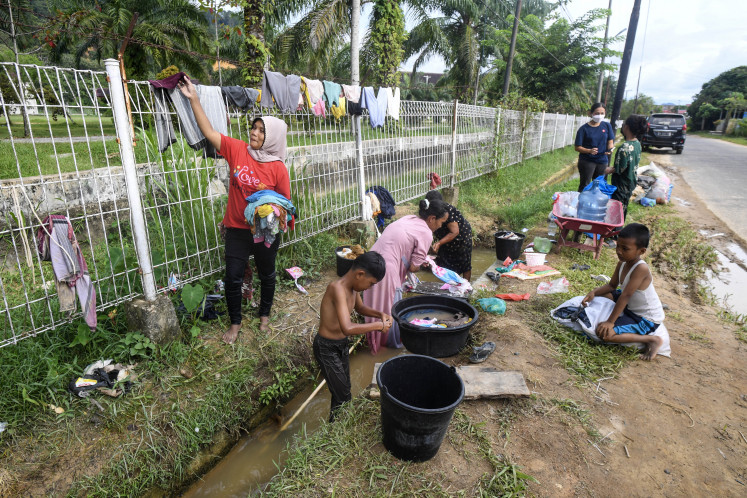Popular Reads
Top Results
Can't find what you're looking for?
View all search resultsPopular Reads
Top Results
Can't find what you're looking for?
View all search resultsFintech Talk: Fintech potential in deepening capital market penetration (Part 2)
Synergy between financial technology (fintech) start-ups — with investment banks and securities firms — is believed to be capable of increasing the number of investors in Indonesia.
Change text size
Gift Premium Articles
to Anyone
Synergy between financial technology (fintech) start-ups — with investment banks and securities firms — is believed to be capable of increasing the number of investors in Indonesia. However, there is still a lack of fintech pioneering companies focusing their business model on the development of the capital market industry, as the number of domestic investors remains limited despite the opportunity from the demographic bonus and working class society exceeding 100 million that seems appealing.
In reality, capital markets provide the financial service that is ripe for synergy with fintech, as companies within this domain are accustomed to digital developments within the financial sector. Therefore, collaboration between fintech and capital markets should be directed toward acquisitions and client engagement, beside ongoing efforts to integrate the back-office system, or the breakthroughs in the simplification of processing savings transactions in mutual funds, shares and bonds.
It’s exciting that recently new innovations have been developed in fintech’s capital markets domain, one of which is sociotrading, a digital investor community that is accessed via websites or mobile phone applications. The sociotrading platform in Indonesia was initiated by OlahDana, which facilitates community financial mentors through digital features such as follow and copy-trade.
Investment managers are able to target more extensive retail segments through digital means such as products offered via Bareksa as a sales agent. On the other hand, consumers also benefit as they are able to access more options for mutual funds products that are made available through these services.
(Read also: Fintech Talk: Fintech potential in deepening capital market penetration (Part 1))
Another development made in the fintech capital market world is robotrading, in which investors are given the facilities to take a quantitative approach based upon statistics and mathematics, which is used in creating the appropriate mix of savings and shares. These technologies that are currently being developed in Japan and South Korea, however, are expected to be developed and implemented in Indonesia over the coming five years, acknowledging that local cultural and communicative norms place greater importance on personal interactions rather than robotics.
In addition to fintech that targets secondary capital markets, there is also fintech that targets pre-initial public offering (IPO) markets, nicknamed angel trading and commonly known as crowd-funding equity, which is the joint purchase of shares in micro, small and medium enterprises by investors in the pre-IPO market or at the stage before a company is fit and ready to be listed and traded on the stock exchange.
With its significant potential, fintech must continue to tangibly prove that its role and function are capable of being at the cutting edge of interactions between capital markets and the community, going beyond current efforts.
Fintech must also strengthen its own position as an effective agent of change, in which the platforms offered are suitable to the needs of the Indonesian market and in which the customer relations management strategy is credible and able to make a substantial positive impact on the capital market industry.
The readiness of domestic markets itself is evident from the 326.3 million mobile phone connections, the availability of 3G and 4G services, the millennial generation of 80 million people and a working class that has exceeded 100 million people, which are ready to be engaged by fintech services through a suitable approach.
Put simply, the target for Single Investor Identification (SID) is 5 percent of the total population, equivalent to 12.75 million investors, up from the current total of 0.35 percent, which is 886,000 investors. This is upon the assumption that the total population is consistent and the number of investors will increase by 2 million annually and therefore the target to achieve total SIDs at 5 percent of the population will be achieved in six years and constitute 10 percent of the total working class.
The government can assist in achieving this by implementing initiatives that would oblige stateowned enterprise (SOE) employees and civil servants to place some of their savings in capital markets, not just banks. Remuneration could also be provided in the form of shares in SOEs operating in the infrastructure, mining, or telecommunications sectors, to at least 100 million working class Indonesians, which is similar to policy implemented in other countries. Through such initiatives, the number of SIDs is expected to increase significantly to levels similar to the number of bank savings accounts, which currently totals 170 million accounts with values less than Rp 100 million.
In addition to this, we see a need for greater development and further support from the Financial Services Authority (OJK), Bank Indonesia (BI), the Creative Economy Agency (Bekraf), the Communications and Information Ministry and the StateOwned Enterprises Ministry. The OJK, BI and the Communications and Information Ministry especially, as government agents that are closely involved in the development of the fintech capital market, must oversee and maintain the acceleration in the domestic investor base operating in mutual funds, bond markets and stock markets.
Capital markets are expected to reserve current investor composition figures, which are 65 percent foreign investors and 35 percent domestic investors in stocks and 40 percent foreign and 60 percent domestic in bond markets, in order to enable domestic investors to become the dominant actors in their own markets and enjoy the rewards of their investments.
Therefore, it is hoped that supplementary policy that supports financial transactions and capital markets that are pro-fintech may be implemented, in addition to faster connectivity to foster innovative trading on capital markets, especially beyond the island of Java.
The article is the last part of two articles











